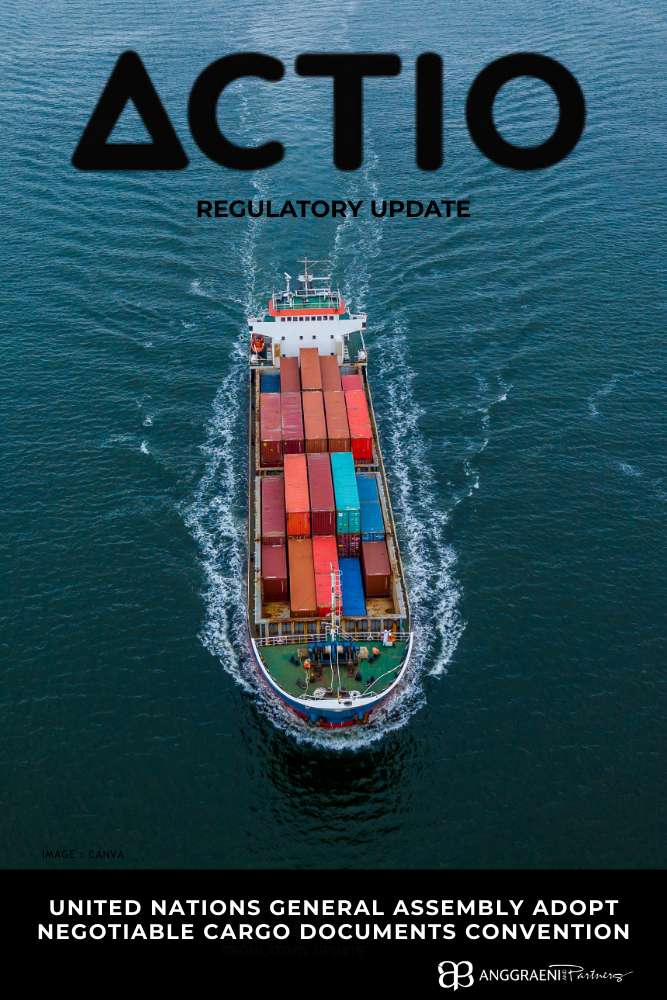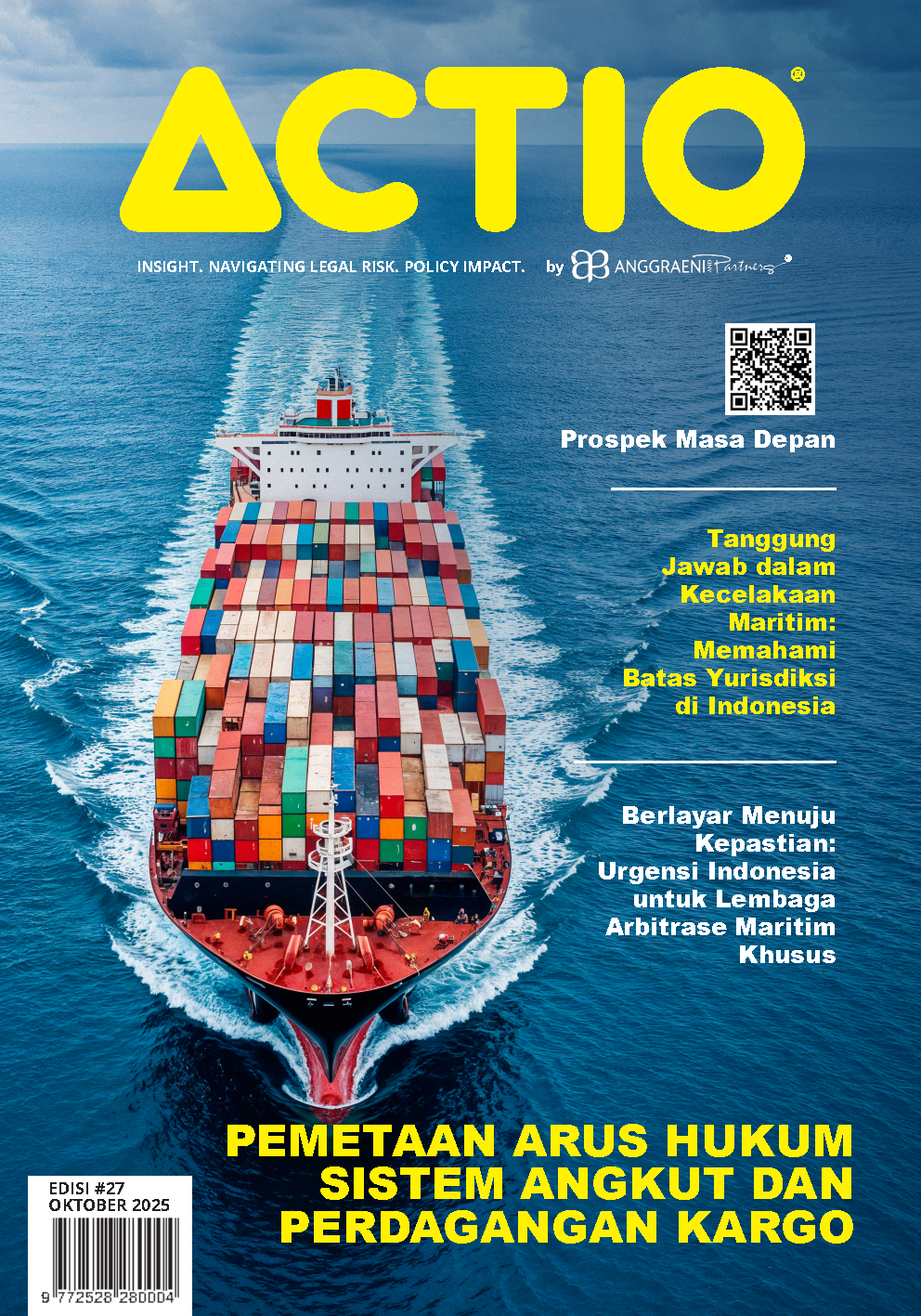Having Closer Look at the Draft International Private Law Bill: Implication to the Enforcement of Foreign Judgment in Indonesia
By : Setyawati Fitrianggraeni, Eva F Fauziah, Irvena A. Dewanto[1]
Keywords : International Private Law Bill, Enforcement of Foreign Judgment, Indonesia, Private International Law (PIL), Recognition and Enforcement of Foreign Court judgments, Transnational Litigation, United Nations Convention on the Recognition and Enforcement of Foreign Arbitral Awards, Arbitration and Alternative Dispute Settlement.
The era of globalization and free trade has prompted the need for a regulation that can resolve various Private International Law (“PIL”) issues in Indonesia.[2] To fill in the gap, currently, the government of Indonesia is in the process of drafting a PIL bill. The bill will address several PIL Issues among others determination of the international jurisdiction of the Indonesian Courts,[3] appointment and determination of the Internal Law that applies to civil law relationships that contains foreign elements,[4] enforcement of foreign court judgment in Indonesia,[5] the applicability of other laws in the event that the PIL Bill does not contain specific regulations,[6] the applicability of legal principles and/or international customs related to PIL in the absence of legal arrangements in the PIL Bill and other laws,[7] choice of law,[8] and choice of forum.[9] The government has targeted for the ratification of the bill by the year 2023.[10] This article invites readers specifically to a closer look at how the latest PIL bill would affect the enforcement of foreign judgment – a significant element in transnational litigation, in Indonesia.[11]
The existing general principles of PIL still refer to the colonial regulations, particularly Art. 16, 17, and 18 of Algemene Bepalingen van Wetgeving voor Indonesie (“AB”). AB and Rv are regulations that were created by the Dutch East Indies government during the colonial period.[15] AB serves as the general provisions regarding legislations,[16] whereas Rv serves as a source of Civil Procedural Law.[17] The applicability of AB and RV is based on Art. 1 of the transitional rules of the 4th Amendment of the 1945 Constitution of the Republic of Indonesia, “All existing laws and regulations are still valid as long as new ones have not been enacted according to this Constitution”.[18]
Decisions of foreign courts cannot be executed within the territory of the Republic of Indonesia unless provided for in separate laws, bilateral or multilateral agreements in accordance with the principle of reciprocity, which excludes the application of Art. 436 Rv.[19] Furthermore, pursuant to Art. 436 par. (2) of Rv, Yahya Harahap explained that foreign court decisions can only be executed in Indonesia by making such decision as a legal basis for filing a new lawsuit in an Indonesian court.[20] Subsequently, such foreign court decision can be used by the Indonesian court as written evidence with case by case binding force, meaning the foreign Court decision either:
- Can be regarded as an authentic deed that has perfect and binding evidentiary power; or
- Merely as a legal fact that is assessed independently in accordance with the judge’s considerations.[21]
Provisions regarding the recognition and enforcement of Foreign Court judgments is regulated in Chapter IX of the PIL Bill. It consists of 4 Articles covering the topics of recognition and enforcement subject to reciprocal international agreements, unrecognized Foreign Court judgements, mechanism for recognition and enforcement, and Foreign Court judgement as a preliminary matter.
Enforceable court judgments will be limited to those rendered in countries with whom Indonesia has related agreements. According to Art. 64, “Recognition and enforcement of Foreign Court judgements are subject to international agreements that are reciprocal and binding on the Republic of Indonesia with the country where the Foreign Court is domiciled”.[22]
In the event that a Foreign Court judgement based on statutory regulations cannot be recognized in Indonesia, then such Foreign Court judgement constitutes a decision that is not recognized in Indonesia.[23] The draft PIL Bill does not regulate any further regarding the definition of recognition of Foreign Court judgements and the implications if such decisions are not recognized. However, the spirit seems like the terms adopted in the United Nations Convention on the Recognition and Enforcement of Foreign Arbitral Awards (“New York Convention 1958”) as ratified through Presidential Decree No. 34 of 1981, which differentiates between “recognition” and “enforcement” – terms that are later used in Law No. 30 of 1999 on Arbitration and Alternative Dispute Settlement. According to Prof. Sudargo Gautama, recognition of an arbitral award can be defined as viewed as a passive activity where a judge accepts a foreign award and everything stated in such arbitral award regarding the position of the parties in a dispute, and the award is acknowledged by the judge concerned.[24] This is differentiated from cases where enforcement is required which has further consequences.[25] In addition to recognition, judges from foreign countries are also actively asked to enforce the contents of an arbitral award that have been rendered abroad.[26] Thus, if a foreign arbitral award is not recognized, it cannot be enforced.[27]
Furthermore, the requirements for the application for the recognition and enforcement of Foreign Court judgements is regulated in Art. 66. It stipulates that, “Applications for the recognition and enforcement of Foreign Court decisions must be submitted to a competent Indonesian court based on the provisions of laws and regulations by attaching evidence in the form of documents:
- a copy of the decision of the Foreign Court;
- official document confirming that the decision has become final and binding[28]; and
- if the award is made in the absence of either party, official document proving that the party has been duly summoned and has had the opportunity to present a defense”.[29]
In the event that the decision of the Foreign Court is submitted in a dispute settlement process as a preliminary matter in the examination of the case, the Indonesian Court[30] applied for is authorized to determine the recognition or refusal of the decision.[31] Preliminary matter as mentioned above refers to legal issues that have a close relationship with the subject matter that must be answered before the judge continues the trial of the case. [32]
Through the creation of the PIL Bill, foreign court judgements would be able to be both recognized and enforced in Indonesia directly, through application to a relevant Indonesian court by attaching evidence in the form of documents. The long-awaited Bill is expected to solve foreign judgment enforcement issues especially since existing mechanism for foreign judgment enforcement remains restricted to only using such judgement as a legal basis for filing a new lawsuit. This is a rather complex, lengthy, and convoluted process. While the drafting is not yet final, it gives us hope that the ratification of the PIL Bill could ease and accommodate various needs arising from cross-border interactions.
Bibliography:
Books
Gautama, Sudargo. Indonesia dan Konvensi-Konvensi Hukum Perdata Internasional. Bandung: Penerbit Alumni, 1983.
Harahap, M. Yahya. Hukum Acara Perdata.
Dutch East Indies. Algemene Bepalingen van wetgeving voor Indonesie, Staatsblad 1847-23 in Basuki Zulfa Djoko et al. Hukum Perdata Internasional. Banten: Penerbit Universitas Terbuka, 2014.
Journals
Orchita, Viva, FX. Joko Priyono, Nanik Trihastuti. “Pelaksanaan Putusan Pengadilan Asing di Indonesia (Studi Loan Agreement Antara Republik Indonesia dan Nordea Bank Danmark A/S (Denmark).” Diponegoro Law Journal 5, no. 4 (2016): 15.
Laws
Indonesia, 4th Amendment of the 1945 Constitution of the Republic of Indonesia.
Indonesia. Law Concerning Arbitration and Alternative Dispute Settlement. Law No. 30 of 1999. SG No. 138 Year 1999, SSG No. 3872.
Indonesia. Private International Law Bill.
Websites:
Fachri, Ferinda K. “Pemerintah Targetkan RUU Hukum Perdata Internasional Disahkan Tahun 2023.” HukumOnline. October 22, 2022. https://www.hukumonline.com/berita/a/pemerintah-targetkan-ruu-hukum-perdata-internasional-disahkan-tahun-2023-lt6352e472e0017/?page=1.
Ministry of Law and Human Rights, National Legal Development Agency. “Results of the Harmonization of the Academic Manuscripts of the Civil Procedural Law Draft.” BPHN. January 19, 2023. https://www.bphn.go.id/data/documents/na_ruu_haper.pdf.
National Legal Development Agency, Ministry of Law and Human Rights. “Analisa dan Evaluasi Peraturan Perundang-undang Peninggalan Kolonial Belanda.” BPHN. February 16, 2023. https://bphn.go.id/data/documents/ae_peraturan_perundang-undangan_peninggalan_kolonial_belanda.pdf.
[1] Setyawati Fitrianggraeni is Managing Partner at Anggraeni and Partners, Indonesia, Assistant Professor at the Faculty of Law University of Indonesia, and PhD Candidate at the World Maritime University, Malmo, Sweden, Eva F. Fauziah is Senior Associate at Anggraeni and Partners Practice Group of International Arbitration and Litigation, and Irvena A. Dewanto is a Junior Associate at Anggraeni and Partners Practice Group of International Arbitration and Litigation. Writers would like to thank Dr. Hary Elias for his time to provide feedbacks to the article.
[2] Indonesia, Private International Law Bill, Considerations, letter (b).
[3] Ibid, Art. 2 point (a)
[4] Ibid, Art. 2 point (b)
[5] Ibid, Art. 2 point (c)
[6] Ibid, Art. 3.
[7] Ibid, Art. 4.
[8] Ibid, Art. 47 – 56.
[9] Ibid, Art. 59 point (e)
[10] Ferinda K Fachri, “Pemerintah Targetkan RUU Hukum Perdata Internasional Disahkan Tahun 2023,” HukumOnline, October 22, 2022, https://www.hukumonline.com/berita/a/pemerintah-targetkan-ruu-hukum-perdata-internasional-disahkan-tahun-2023-lt6352e472e0017/?page=1.
[11] Indonesia, Rancangan Undang-Undang Republik Indonesia Nomor…Tahun…Tentang Hukum Perdata Internasional in HukumOnline, “Rancangan Undang-Undang Tahun 2022 Hukum Perdata Internasional,” HukumOnline, February 14, 2023, https://www.hukumonline.com/pusatdata/detail/lt630db69b06e3a/rancangan-undang-undang-tahun-2022?r=1&p=1&q=ruu%20hpi&rs=1847&re=2023.
[12] Dutch East Indies, Algemene Bepalingen van wetgeving voor Indonesie, Staatsblad 1847-23 in Zulfa Djoko Basuki et al., Hukum Perdata Internasional, (Banten: Penerbit Universitas Terbuka, 2014), 1.7, 1.30, 1.31, Art. 16 AB “Legal provisions concerning the status and authority of persons remain binding on Indonesian citizens if they are abroad”; Art. 17 AB, “Towards immovable goods apply the law of the country or place where the goods are located”; Art. 18 AB, “The form of each legal action will be decided by the court according to the laws of the country or place where the legal action is taken. In order to apply this article and the previous article, attention must be paid to the differences made by legislation between Europeans and Indonesians”.
[13] M. Yahya Harahap, Hukum Acara Perdata.
[14] Viva Orchita, FX. Joko Priyono, Nanik Trihastuti, “Pelaksanaan Putusan Pengadilan Asing di Indonesia (Studi Loan Agreement Antara Republik Indonesia dan Nordea Bank Danmark A/S (Denmark),” Diponegoro Law Journal 5, no. 4 (2016): 15.
[15] National Legal Development Agency, Ministry of Law and Human Rights, “Analisa dan Evaluasi Peraturan Perundang-undang Peninggalan Kolonial Belanda,” BPHN, February 16, 2023, https://bphn.go.id/data/documents/ae_peraturan_perundang-undangan_peninggalan_kolonial_belanda.pdf.
[16] Ibid.
[17] Ministry of Law and Human Rights, National Legal Development Agency, “Results of the Harmonization of the Academic Manuscripts of the Civil Procedural Law Draft,” BPHN, January 19, 2023, https://www.bphn.go.id/data/documents/na_ruu_haper.pdf.
[18] Indonesia, 4th Amendment of the 1945 Constitution of the Republic of Indonesia, Transitional Rules, Art. 1.
[19] Harahap, Hukum Acara Perdata.
[20] Ibid.
[21] Ibid.
[22] Private International Law Bill, Art. 64.
[23] Ibid, Art. 65.
[24] Sudargo Gautama, Indonesia dan Konvensi-Konvensi Hukum Perdata Internasional, (Bandung: Penerbit Alumni, 1983), 334.
[25] Ibid.
[26] Ibid.
[27] Ibid.
[28] Known as inkracht or berkekuatan hukum tetap
[29] Private International Law Bill, Art. 66.
[30] The PIL Bill defines Indonesian Court in Art. 1 par. (7) as “Indonesian courts are all courts within the general court or religious court”.
[31] Ibid, Art. 67.
[32] Ibid, Elucidation of Art. 67.
DISCLAIMER
The information contained in this Legal Insight is not intended to provide legal opinion or views of the Anggraeni and Partners law offices against a particular legal issue.
Neither party may assume that he or she should act or cease to act or choose to act on a particular matter based on this information without seeking advice from professionals in the field of law in accordance with certain facts and circumstances it faces.
For further information, please contact:
WWW.AP-LAWSOLUTION.COM
P: 6221. 7278 7678, 72795001
H: +62 811 8800 427
S F Anggraeni
Managing Partner
fitri@ap-IawsoIution.net
Eva F Fauziah
Senior Associate at Anggraeni and Partners Practice Group of International Arbitration and Litigation &
Head of Legal Lab




